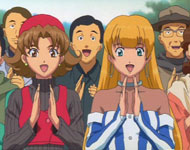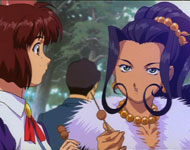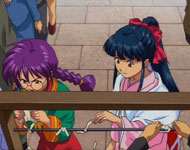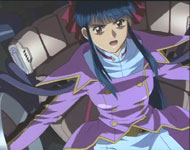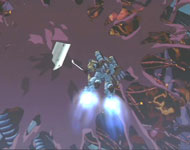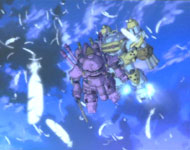

Quick Links:
Sakura Wars: The Movie - Original Soundtrack
Those of you who read my review of the Sakura Wars movie will know that I did not particularly care for the film. It had a lame plot, it had no character development, and it pretty much felt like an attempt to cash in on the large fan base that the video games had. Outside of that, though, it was very pretty, and the music was excellent, at least in comparison to the rest of what went into the film. So, now that I am nicely removed from my disappointment in the film itself, I figure it is time to take a more critical look at the music, as contained in the official soundtrack.
At this point I feel that I need to mention that I am a big Sakura Wars fan. I've played the first two video games, I've seen the TV show, and I've watched the OVAs. I own the licensed doujinshi, most of the Japanese soundtrack CDs, and more art books than is probably sane. Thus, I am not an unbiased reviewer. I simply know this property too well, and am perhaps a little too familiar with the standard Sakura Wars musical themes. Please keep that in mind as you read this review.
The tracks on this soundtrack seem to map pretty closely to the order in which the pieces are used in the film. The CD starts with the opening number from the film, the fan favorite "Miracle Bell" from the second Sakura Wars video game. This track is pretty long, almost seven minutes, and as great a song as it is from a composition standpoint, this version is a little too "busy." It just has a little too much going on with the full orchestra and choir. I can understand the need to try to "kick it up a notch" from the version in the game (which is awesome, by the way), but the extra flourishes end up being a little distracting in the end. The rest of the album mostly consists of your traditional background tracks, ranging from thirty seconds to a little over two minutes in length, and designed to highlight the emotions being delivered on screen.
The background music in the movie seeks to serve dual purposes. First, naturally, the music is intended to back up what is happening on the screen. Thus, when the bad guys are getting screen time you get dark, somber music, and when the girls of the Flower Division (Hanagumi) are on screen, you get happier, softer music. Second, the music is intended to give the movie an overall "Sakura Wars" feel. By the time the movie was released in Japan, there had been three video games, two OVA series, and a television series, not to mention the drama and music CDs. Kohei Tanaka has scored all of the music for the series, so since the fans have been hearing the same sounds for years now, we know to expect a certain sound, which is an interesting mix of 1920s-1940s jazz and big band sounds mixed with more traditional Japanese music and a little Latin flair, of all things (though the Latin influence does not show up on this particular album). Naturally, the film utilizes a full orchestra, whereas the video games used keyboards and synthesized sounds, so it doesn't sound exactly the same from medium to medium, but there are certain musical runs that you just associate with Sakura Wars after playing the games and watching the videos. Sure enough, many of those pieces make their way into the movie.
For example, track 13, "New Year of the Flower Division," includes elements from some of the music in the video game that was used during everyday scenes, such as running across other members of the Flower Division in the park, or taking tickets before a show. The use of these familiar themes gives the experienced listener an unconscious clue about the nature of the scene. The most blatant use of this is in track 24, "Counterattack, Then...," which is really just a variation on the original Sakura Wars theme song. It has a very long and dramatic intro, but as soon as the "verse" from the original song starts, you know exactly what it is. There isn't anything here that really branches out from the general Sakura Wars musical repertoire, though the opera music at the end of the movie is a little more dramatic than normal.
If you are coming to this soundtrack without any pre-conceived notions of what it should contain, then you will have a different encounter than the long-time fan will. Without those pre-conceived notions of what the music should be, you will not be aware of the auditory cues throughout the soundtrack. You will simply perceive the music on its own merits. For example, let's take track 8, "Trouble Outbreaks - Marching!" This rather long track is used to back up the (ridiculously) long buildup before the first battle, as the Flower Division load up the train with their Koubu (big robots) and sally forth to the battle. Sakura Wars fans will recognize certain parts of this track as being based off of the pre-battle music in the video games. However, people without that knowledge will only hear some obviously martial music, with variations between themes of conflict and triumph.
In fact, there is a lot of martial music on this CD. I guess with "Wars" in the title that is to be expected. The movie itself doesn't have very many "light" moments (though those that do exist have music represented on this CD), so the majority of the tracks are fairly dark and/or heavy. Some people will like this, and some people won't. I don't particularly care for it, but as one of the aforementioned people that like Sakura Wars a little too much, I have a solid understanding of the musical foundation this album is building upon. Thus, I can still find those familiar themes to fall back on, even on the darker tracks. Others will not have that foundation, though, and will have to take the music at face value.
Bottom line, I would have to say that this album is really for the bigger fans of the Sakura Wars property. To date, it is the only domestically-available piece of Sakura Wars music, so people like me are basically honor-bound to buy it. Those of you who are able to think more rationally will want to carefully consider how much the music in the movie affected you. If it had a large impact on you, then by all means pick up and enjoy this album. For the rest of you, realize that this album has a disproportionate number of "darker" tracks, and make your decision accordingly.

